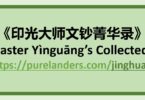利人自利,自利自害
[230] Benefitting People [Has] Personal Benefits, Benefitting Oneself [Has] Personal Harms
佛与众生,心体是一,而其所受用,天渊悬殊者,以其用心不同之所致也。
[Of the] Buddhas and sentient beings, [their] minds’ essence are one. However, their benefits, [are like] that wide gap [between the] sky [and a deep] abyss, with their diligent applying [of] minds not [the] same, [by] that caused.
[Note 1: All Buddhas and sentient beings have the same Buddha-nature (佛性), the potential to accomplish Buddhahood (成佛), with the first having realised it fully, and the latter yet to – due to lack of diligence in spiritual cultivation (修行).]
佛则唯以无缘大慈,同体大悲,度脱众生为怀,了无人我彼此之心。纵度尽一切众生,亦不见能度所度之相。故得福慧具足,为世间尊。
[The] Buddhas [are] thus only with unconditional great loving-kindness, [with the] same body [having] great compassion, [with] deliverance [and] liberation [of] sentient beings as [their] hearts, completely without [the] minds [of] others [and] self, one another. Even if completely delivering all sentient beings, also not seeing forms of [those] able [to be] delivered [and] those delivered. Thus attaining blessings [and] wisdom complete, as [the] world’s honoured [ones].
[Note 2: To be with unconditional great loving-kindness (无缘大慈) is to wish all sentient beings to be well and happy, even if there is no or little karmic affinity with some of them at the moment. To be with the same body having great compassion (同体大悲) is to act to remove all sentient beings’ suffering, as if they are on one’s own body.]
[Note 3: To be without the minds of others and self (人我) is to be non-dualistic (不二), without attachment to the delusion of there being permanent and substantial others in contrast to oneself.]
众生唯以自私自利为事,虽父母兄弟之亲,尚不能无彼此之相,况旁人世人乎哉?故其所感业报,或生贫穷下贱,或堕三途恶道。
Sentient beings, only with selfish personal benefits doing matters, although [with] relatives of fathers, mothers [and] siblings, [are] still not able [to be] without forms of one another, moreover [of] people nearby [and the] world’s people. Thus [with] their connected karmic retribution, perhaps born poor [and] lowly, or falling [into the] three [lower] realms’ evil paths.
[Note 4: The three lower realms (三途) are the evil paths (恶道) of hell-beings (地狱众生), hungry ghosts (饿鬼) and animals (畜生).]
即令戒善禅定自修,得生人天乐处。但以无大悲心,不能直契菩提,以致福报一尽,仍复堕落。可不哀哉!
Even if [with the Five] Precepts, [Ten] Good [Karmas and] meditative concentration personally cultivated, attaining births [in] human [and] heavenly joyful places, however, without great compassion’s mind, not able [to be] directly agreeable [with] Bodhi, with [this] leading [to, when] blessed rewards once exhaust, still again falling. How [is this] not pitiful?
[Note 5: The Five Precepts (五戒) are to abstain from (i) killing, (ii) stealing, (iii) sexual misconduct, (iv) lying and (v) intoxicants (杀盗淫妄酒). The good observation of these can lead to a human rebirth.]
[Note 6: The Ten Good Karmas (十善业) are to have the body not doing matters of (i) killing lives, (ii) stealing and (iii) sexual misconduct; the mouth not speaking words of (iv) false speech, (v) frivolous speech, (v)i double-tongued speech and (vii) harsh speech, and the mind not giving rise to thoughts of (viii) greedy desires, (ix) anger and (x) ignorance). (身不行杀生、偷盗、邪淫之事,口不说妄言、绮语、两舌、恶口之话,心不起贪欲、嗔恚、愚痴之念) The good practice of these can lead to a heavenly rebirth.]
[Note 7: To have great compassion’s mind (大悲心) is to have given rise to the Bodhi Mind (菩提心: Bodhicitta), which is the vow to guide one and all to Great Bodhi (大菩提) or Buddhahood (佛果), which includes liberation. Without aspiration for liberation, while still being trapped in rebirth, when blessed rewards (福报) are exhausted, one will fall into a lower realm.]
是则唯欲利人者,正成就其自利。而唯欲自利者,乃适所以自害也。
[It] is thus, [with] those only desiring [to] benefit people, [who] precisely accomplish their personal benefits. And those only desiring [to have] personal benefits, thus match those with personal harms.
[Note 8: This are counterintuitive truths, that the more there is focus on helping others, the more will oneself be helped, as this will give rise to selfless words and deeds, that will help others, thus creating good karma (善业), that eventually helps oneself. Likewise, the more there is focus on helping oneself, the more will oneself be harmed, as this will give rise to selfish words and deeds, that will harm others, thus creating evil karma (恶业), that eventually harms oneself.]
净土宗十三祖印光大师
Pure Land Tradition’s 13th Patriarch Great Master Yìnguāng
《印光法师文钞》(正编):药师本愿经重刻跋;
Dharma Master Yìnguāng’s Collected Writings (First Compilation): Afterword [For] Re-carving [Of] ‘Medicine Master’s Fundamental Vows’ Sūtra’;
印光大师文钞菁华录(第两百三十则):六、劝注重因果:甲、明因果之理(第八则)
Record [Of] Great Master Yìnguāng’s Collected Writings’ Essence (230th Short Section): 6th [Chapter]: Encouragement [To] Pay Attention [To] Cause [And] Effect: First, Understanding Principles Of Cause [And] Effect (8th Short Section)
[Ref: #230 / 6.1.8]
Namo Amituofo : Translation and notes by Shen Shi’an
下一部分
Next Part:
信因果,无怨尤
[231] With Faith In Cause And Effect, Thus Without Resentment
https://purelanders.com/2022/07/09/with-faith-in-cause-and-effect-thus-without-resentment
上一部分
Previous Part:
祸福无门,唯人自召
[229] Misfortunes And Blessings Are Without Doors, Only By People Personally Summoned
https://purelanders.com/2022/09/22/229-misfortunes-and-blessings-are-without-doors-only-by-people-personally-summoned
完整典籍
Complete Text:
《印光大师文钞菁华录》
Record Of Great Master Yìnguāng’s Collected Writings’ Essence
https://purelanders.com/jinghualu






